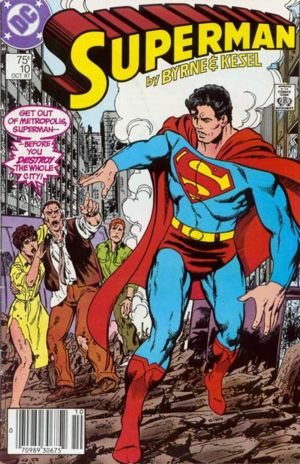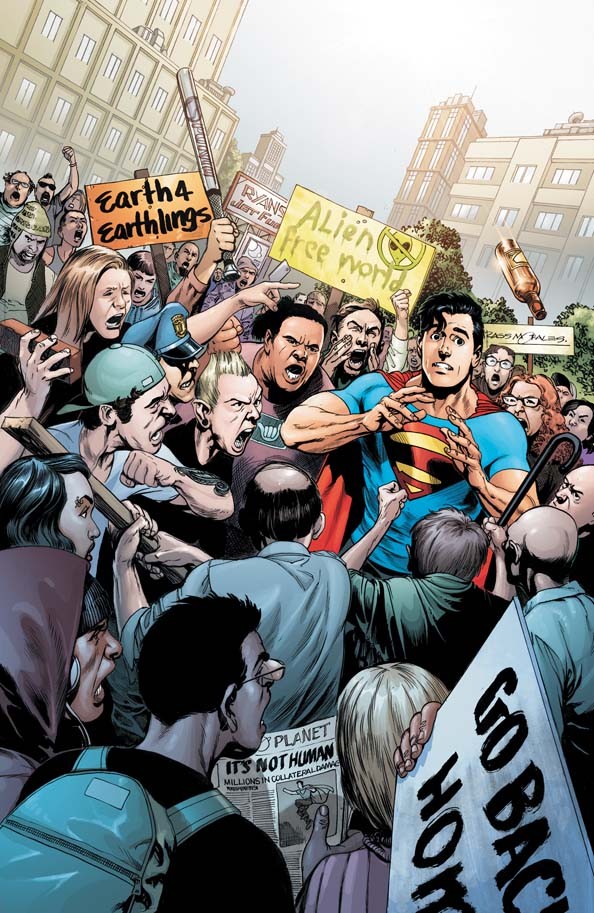smallville fan
Hero
- Joined
- Nov 20, 2009
- Messages
- 5,205
- Reaction score
- 129
- Points
- 73
I don't think that's an excuse. If you leave something absolutely vital out of your movie and then say "we'll get to it in the sequel," you still have a movie with a huge missing piece. Film series are fine, but each installment has to be self contained to an extent. The plot doesn't necessarily have to be wrapped up in each film but they still have to address things, especially things of this magnitude. Making it the focus of the next film doesn't change the fact that we cut from a destroyed metropolis to Superman smiling and joking with his mom and then cut to Metropolis where everything looks fine and like it's business as usual. Even if they pick it up in the next film, the fact that it's not addressed at all in the first one is a flaw with that movie.
I apologize for continually making this comparison, but The Avengers didn't save addressing the destruction in their climax for the sequel and it only made the film stronger.
Maybe you were meant to watch this and future films back to back? Besides Star Wars did exactly the same thing. In A New Hope, Luke was given this awesome weapon and told about this "Force" and this grand legacy of Jedi Knights he's part of. Yet, that was barely explored in that film by itself. He uses a lightsaber once for barely 5 minutes and the force only in the Death Star trench run. When Empire Strikes Back happened along with Return of the Jedi we only see Luke really embrace his legacy and the lightsaber as well as using the force to the best of his ability. Bottom line is, Luke's story fleshed out in the sequels. Not everybody has to follow "some set of rules" when it comes to coming up with how the movie goes. Some things are just too big to be explored in one movie. As for that scene of the next minute being at Kent Farm, anybody could tell considerable time has passed.

 t
t in TDKR and now MOS where there's this emotional disconnect that just makes the movie and characters feel off and cold. One example is when Zod and Co. arrived over Metropolis and all the fear among humans (one of the few moments done well) is immediately undone the next day when things just seemingly go back to normal with this looming alien threat. I mean people are going back to work, school etc. like nothing happened and I'm supposed to be invested in this film. You can't raise the question of how would people react if they knew aliens etc.....and not have widespread panic and fear worse when the aliens have threatened you. The big question is posted, clearly a central theme, repeated about a million times and then we get no answers and end on a happily ever after kinda note. WTH? This is only one of the many emotionally and logically detached moments of the film. The thing that drew me (personally) to DC was their attempt to ground their stories as close to reality as possible but the way things are going we might not be able to differentiate between them and the other guys....which is just sad.
in TDKR and now MOS where there's this emotional disconnect that just makes the movie and characters feel off and cold. One example is when Zod and Co. arrived over Metropolis and all the fear among humans (one of the few moments done well) is immediately undone the next day when things just seemingly go back to normal with this looming alien threat. I mean people are going back to work, school etc. like nothing happened and I'm supposed to be invested in this film. You can't raise the question of how would people react if they knew aliens etc.....and not have widespread panic and fear worse when the aliens have threatened you. The big question is posted, clearly a central theme, repeated about a million times and then we get no answers and end on a happily ever after kinda note. WTH? This is only one of the many emotionally and logically detached moments of the film. The thing that drew me (personally) to DC was their attempt to ground their stories as close to reality as possible but the way things are going we might not be able to differentiate between them and the other guys....which is just sad.

